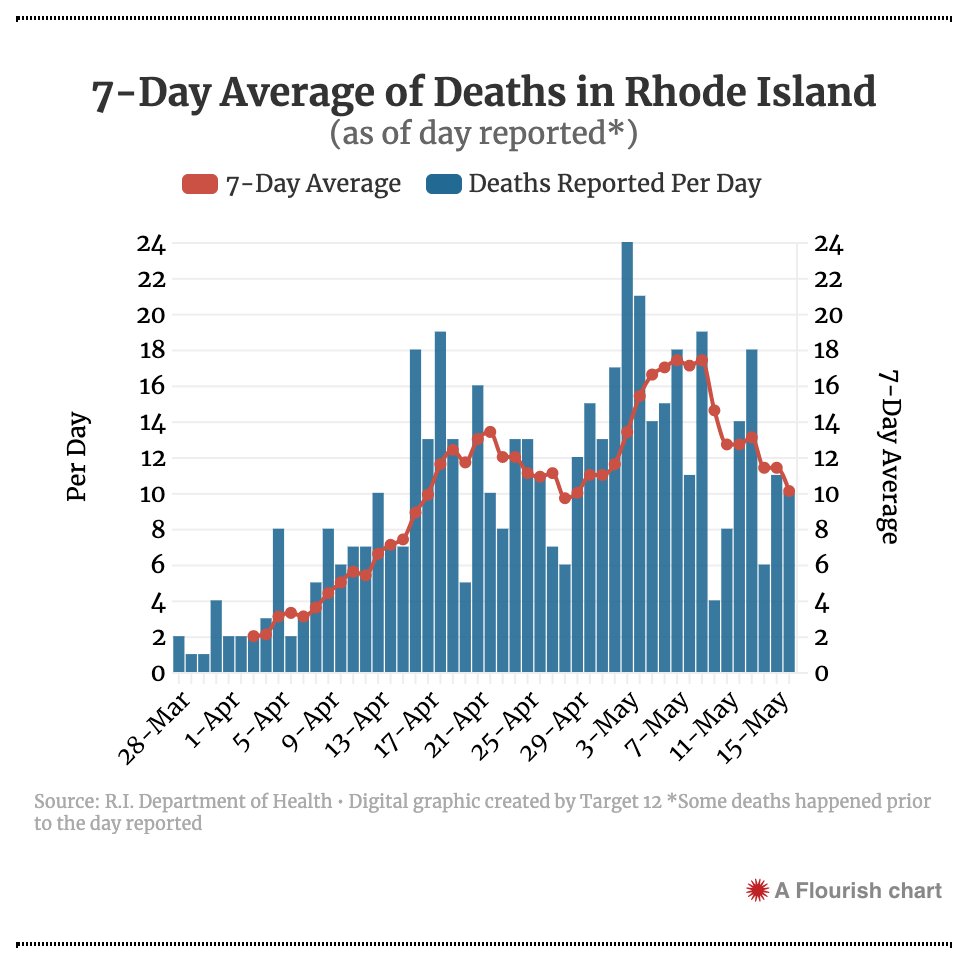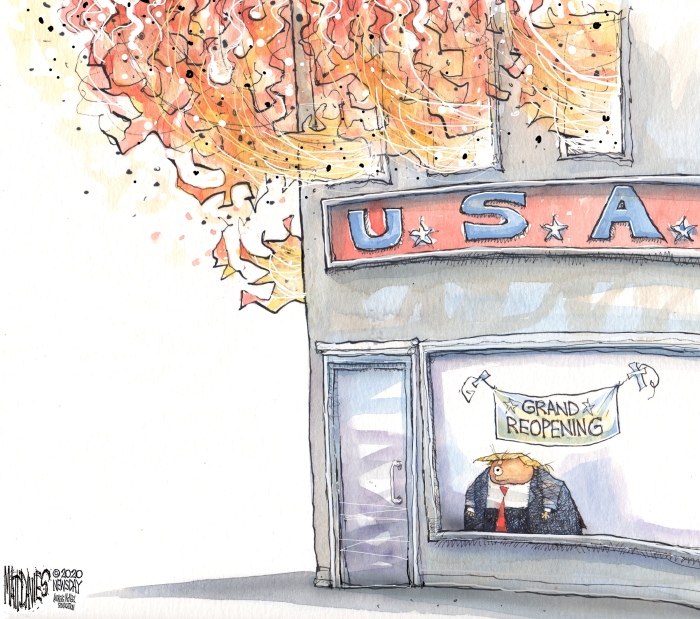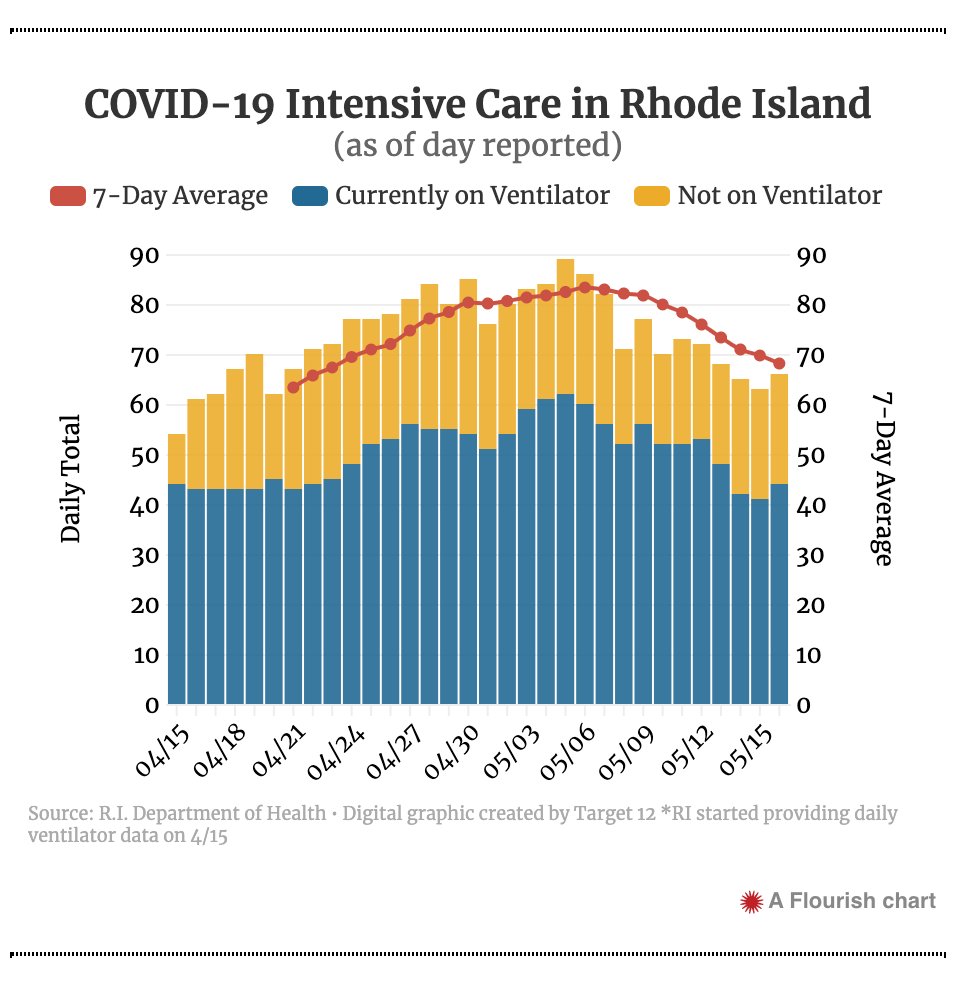COVID-19, the gift that keeps on giving
By Will Collette
 |
| First named storm, Tropical Storm Arthur, comes earlier in the season than expected. |
 |
| Eli Sherman, WPRI |
There is some encouraging data to support this move: a declining Rhode Island death toll, a drop in hospital admissions and number of coronavirus cases in intensive care. Rhode Island’s early and strict stay-at-home mandate is largely responsible for those numbers.
The data showed the number of confirmed cases in Charlestown
inching up to 17. Block Island is no longer COVID-19 free, having logged its
first confirmed case.
We have not yet seen a confirmed case of that awful
COVID-related syndrome that has begun to show up in young children who have
been exposed to the virus. Massachusetts and Connecticut have had cases, so we
will probably see it here soon.
The death demographics are starting to spread out a bit –
deaths among those 30-39 and those over 100 comprise 2% of the state’s total.
One out of three deaths are people between 80 and 89.
CLICK
HERE for all the RI Health Department’s data charts.
What’s next?
More stuff will be legally allowed to re-open and more stuff
will be ILLEGALLY opened as desperate business owners and stupid people decide
they’ve had enough.
The state is committed to doing more testing, relying more
and more on the Abbott Laboratories rapid testing machine where you get the
results in minutes.
There’s a major problem with that equipment: it
fails to detect almost half of the active cases. This system, by the
way, is the same one being used in the Trump White House.
We will need to know how each stage of re-opening affects
infection rates as soon as possible so using a system that misses half the
cases is not very helpful.
The Dolt Rebellion
 |
| By Matt Davies, Newsday |
The right-wing draws its inspiration from Donald Trump’s
failure to act on the virus as its template for the future.
Let’s ignore severe illness, death, as well as long term damage ranging from damaged lungs and hearts to multi-system organ failure in young children. Instead, let’s focus on reopening bars and restaurants, hair salons and beaches.
Let’s ignore severe illness, death, as well as long term damage ranging from damaged lungs and hearts to multi-system organ failure in young children. Instead, let’s focus on reopening bars and restaurants, hair salons and beaches.
Reopen all businesses, they say, even though we can see from
the meat-packing industry that this will mean more infections and lots of
death.
Leading Republicans like Rep. Blake “Flip” Filippi and Sen.
Elaine Morgan (both of whom represent Charlestown), former RI Supreme Court Justice
Bob Flanders and Catholic Bishop of Providence Thomas
Tobin are all calling for rapid re-opening.
So much for Tobin’s so-called right to life credentials.
Our peripatetic state rep Flip Filippi and his family own
hotels, bars and restaurants on Block Island. He told
the Block Island Times that “we’re shooting for a
June opening, with private tables placed throughout our beautiful gardens.
Takeout is on the menu, including our diverse wine palate.”
I not sure what Flip meant by “diverse wine palate” since “palate”
means sense of taste. Maybe he was looking for a jumped-up way to say “wine
list.” Maybe he meant “wine cellar” or some other term a thesaurus could dish
up. Suffice to say Flip has a major self-interest in overturning Ramondo’s
social distancing directives.
Despite this stiff competition, the lead contender for most
doltish COVID-19 behavior may go to the town of Narragansett. Their Town
Council President Matthew Mannix has put forward a resolution directing
town police to disregard Governor Raimondo’s coronavirus executive orders.
I have already received reports that Narragansett Town Beach
was jam-packed earlier this week with few people wearing masks and hardly
anyone observing social distancing.
Raimondo called Mannix’s resolution “selfish” and “reckless”
and she urged the other town councilors to vote it down.
It could be worse
WalletHub, the research firm that compares states on all
sorts of things, just did a survey of which
states suffered the most from COVID-19 related unemployment. Connecticut
was ranked first (for worst), while Rhode Island is way down the list in 48th
place.
Hackers file phony Rhode Island unemployment claims
Hundreds of Rhode Islanders had their unemployment
compensation claims or payments frozen upon discovery that we were being
flooded by fraudulent claims from hackers using stolen data. At least 2000
identity theft complaints have been filed by people whose names were used in this
scam.
The latest news, reported in the New
York Times, blames a “well-organized Nigerian fraud ring” for filing
thousands of claims in Rhode Island and at least seven other states. The
hardest hit so far is Washington state, but claims are also piling up in
Massachusetts.
Target
12 investigators at WPRI say investigators are looking for a link with the
massive hack of credit firm Equifax in 2017 where personal data for nearly 150
million people was stolen.
The state is pledging that all legitimate claims will be
honored and that anyone who’s payments were delayed will get those benefits
retroactively.
And finally, this
 |
| By Mike Thompson, Detroit Free Press |
In that last category, I present Richard J. August of North
Kingstown, a Trumpnik and frequent correspondent to the South County
Independent.
He is to the Independent what Jim Mageau and Phil Gingerella
are to the Westerly Sun – an extreme wingnut with a casual attitude toward the
facts.
In his May
14 letter to the Independent, August tries to present a reasoned argument that
Rhode Island’s government is attempting to use trumped-up fears of coronavirus
to do some nefarious deed.
In point-counterpoint fashion, here are August’s arguments
and my rebuttal:
AUGUST: The state health
director, Dr. Nicole Alexander-Scott, recently acknowledged that 95% of those
known to have contracted the COVID-19 virus have recovered. Some of the five
percent are still hospitalized or have been free of the disease for less than
two weeks and therefore are not deemed to have recovered. As of last week the
number of deaths attributed to the coronavirus is listed as 399 out of 10,779
persons who have tested positive. The mortality rate is therefore less than four
percent. This is about the same as the “regular” influenza virus against which
we receive annual inoculations.
RESPONSE: The mortality rate for COVID-19 is nowhere near
the same as the annual flu. No medical expert knows for sure what the mortality
rate for COVID-19 - we need more testing, as well as anti-body testing for past, undetected cases to get the right number. But Mr. August’s attempt to use the small Rhode Island sample is not valid.
Even if we accept August’s ~4% mortality claim as true, the mortality rate from seasonal flu is typically only around 0.1% in the U.S., forty times lower than August's claim.
AUGUST: The vast majority of
those who succumb to the coronavirus are elderly persons living in confined
quarters like nursing homes and those with “pre-existing health issues” such as
congestive hearth [SIC] failure, diabetes and respiratory problems.
RESPONSE: First, so what? Are all these people expendable in August's reckoning? While true that the elderly are
at the most risk of death, the emergence of a new COVID-19 effect – one that
especially targets very young children – is alarming as hell. Even if you are a
non-elderly adult, contracting coronavirus is a horrible experience. Ask
British Prime Minister Boris Johnson, Tom Hanks or CNN’s Chris Cuomo.
AUGUST: Politicians and public health
officials made the decision to “flatten the curve” of the coronavirus outbreak.
This means extending the pandemic to avoid overwhelming hospitals and protecting
the vulnerable segment of society. The alternative is to let the disease spike
and allow “herd immunity” to take effect. This is what happened to the Spanish
Flu pandemic of 1918-19 that killed up to 100 million people world-wide and
simply disappeared after infecting 25% of the population.
RESPONSE: What got people through the
Spanish Flu was social distancing and face masks. The lack of it among troops sent to
Europe to fight World War I accelerated the spread and the death toll. The city of Philadelphia decided to
suspend social distancing to hold a massive citywide parade for Liberty Loans
to support the war effort. Thousands became infected, the city was quarantined
and nearly 12,000 people died.
Eventually, after two years and three waves, the Spanish Flu did fizzle out after it ran out of people to sicken or kill. It wasn’t so much “herd immunity” as August claims, but a drastic thinning of the herd. When public health experts talk about “herd immunity” they are usually referring to mass vaccination, not mass death.
Eventually, after two years and three waves, the Spanish Flu did fizzle out after it ran out of people to sicken or kill. It wasn’t so much “herd immunity” as August claims, but a drastic thinning of the herd. When public health experts talk about “herd immunity” they are usually referring to mass vaccination, not mass death.
